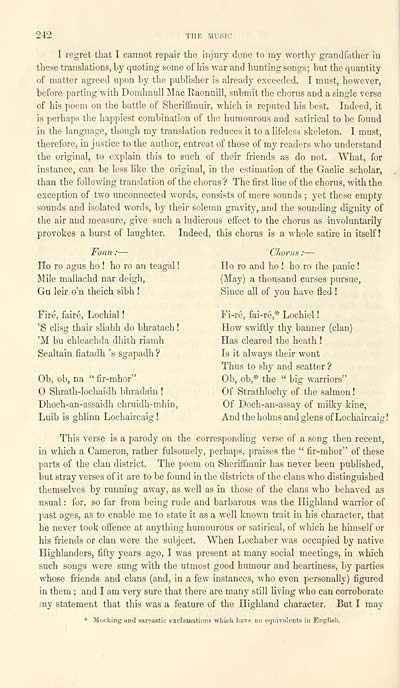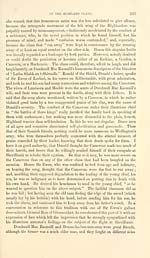Download files
Complete book:
Individual page:
Thumbnail gallery: Grid view | List view

242 THE MUSIC
I regret that I cannot repair the injury done to my worthy grandfather in
these translations, by quoting some of his war and hunting songs; but the quantity
of matter agreed upon by the publisher is already exceeded. I must, however,
before parting with Domhnull Mac Raonuill, submit the chorus and a single verse
of his poem on the battle of SherifTmuir, which is reputed his best. Indeed, it
is perhaps the happiest combination of the humourous and satirical to be found
in the language, though my translation reduces it to a lifeless skeleton. I must,
therefore, in justice to the author, entreat of those of my readers who understand
the original, to explain this to such of their friends as do not. What, for
instance, can be less like the original, in the estimation of the Gaelic scholar,
than the following translation of the chorus ? The first line of the chorus, with the
exception of two unconnected words, consists of mere sounds ; yet these empty
sounds and isolated words, by their solemn gravity, and the sounding dignity of
the air and measure, give such a ludicrous effect to the chorus as invokmtarily
provokes a burst of laughter. Indeed, this chorus is a whole satire in itself!
Fonn : — Chorus : —
Ho ro agus ho ! ho ro an teagal ! Ho ro and ho ! ho ro the panic !
Mile mallachd nar deigh, (May) a thousand curses pursue,
Gu leir o'n theich sibh ! Since all of you have fled !
Fire, faire, Lochial ! Fi-re, fai-re,* Lochiel !
'S clisg thair sliabh do bhratach ! How swiftly thy banner (clan)
'M bu chlcachda dhith riamh Has cleared the heath !
Sealtain fiatadh 's sgapadh ? Is it always their wont
Thus to shy and scatter ?
Ob, ob, na " fir-mhor" Ob, ob,* the " big warriors"
Shrath-lochaidh bhradain ! Of Strathlochy of the salmon!
Dhoch-an-assaidh chruidh-mhin, Of Doch-an-assay of milky kine,
Luib is ghlinn Lochaircaig ! And the holms and glens of Lochaircaig!
This verse is a parody on the corresponding verse of a song then recent,
in which a Cameron, rather fulsomely, perhaps, praises the " fir-mhor" of these
parts of the clan district. The poem on Sheriffmuir has never been published,
but stray verses of it are to be found in the districts of the clans who distinguished
themselves by running away, as well as in those of the clans who behaved as
usual : for, so far from being rude and barbarous was the Highland warrior of
past ages, as to enable me to state it as a well known trait in his character, that
he never took offence at anything humourous or satirical, of which he himself or
his friends or clan were the subject. When Lochaber was occupied by native
Highlanders, fifty years ago, I was present at many social meetings, in which
such songs were sung with the utmost good humour and heartiness, by parties
whose friends and clans (and, in a few instances, who even personally) figured
in them ; and I am very sure that there are many still living who can corroborate
ny statement that this was a feature of the Highland character. But I may
* Mocking and sarcaBtic exclamations which have no equivalents in English.
I regret that I cannot repair the injury done to my worthy grandfather in
these translations, by quoting some of his war and hunting songs; but the quantity
of matter agreed upon by the publisher is already exceeded. I must, however,
before parting with Domhnull Mac Raonuill, submit the chorus and a single verse
of his poem on the battle of SherifTmuir, which is reputed his best. Indeed, it
is perhaps the happiest combination of the humourous and satirical to be found
in the language, though my translation reduces it to a lifeless skeleton. I must,
therefore, in justice to the author, entreat of those of my readers who understand
the original, to explain this to such of their friends as do not. What, for
instance, can be less like the original, in the estimation of the Gaelic scholar,
than the following translation of the chorus ? The first line of the chorus, with the
exception of two unconnected words, consists of mere sounds ; yet these empty
sounds and isolated words, by their solemn gravity, and the sounding dignity of
the air and measure, give such a ludicrous effect to the chorus as invokmtarily
provokes a burst of laughter. Indeed, this chorus is a whole satire in itself!
Fonn : — Chorus : —
Ho ro agus ho ! ho ro an teagal ! Ho ro and ho ! ho ro the panic !
Mile mallachd nar deigh, (May) a thousand curses pursue,
Gu leir o'n theich sibh ! Since all of you have fled !
Fire, faire, Lochial ! Fi-re, fai-re,* Lochiel !
'S clisg thair sliabh do bhratach ! How swiftly thy banner (clan)
'M bu chlcachda dhith riamh Has cleared the heath !
Sealtain fiatadh 's sgapadh ? Is it always their wont
Thus to shy and scatter ?
Ob, ob, na " fir-mhor" Ob, ob,* the " big warriors"
Shrath-lochaidh bhradain ! Of Strathlochy of the salmon!
Dhoch-an-assaidh chruidh-mhin, Of Doch-an-assay of milky kine,
Luib is ghlinn Lochaircaig ! And the holms and glens of Lochaircaig!
This verse is a parody on the corresponding verse of a song then recent,
in which a Cameron, rather fulsomely, perhaps, praises the " fir-mhor" of these
parts of the clan district. The poem on Sheriffmuir has never been published,
but stray verses of it are to be found in the districts of the clans who distinguished
themselves by running away, as well as in those of the clans who behaved as
usual : for, so far from being rude and barbarous was the Highland warrior of
past ages, as to enable me to state it as a well known trait in his character, that
he never took offence at anything humourous or satirical, of which he himself or
his friends or clan were the subject. When Lochaber was occupied by native
Highlanders, fifty years ago, I was present at many social meetings, in which
such songs were sung with the utmost good humour and heartiness, by parties
whose friends and clans (and, in a few instances, who even personally) figured
in them ; and I am very sure that there are many still living who can corroborate
ny statement that this was a feature of the Highland character. But I may
* Mocking and sarcaBtic exclamations which have no equivalents in English.
Set display mode to: Large image | Transcription
Images and transcriptions on this page, including medium image downloads, may be used under the Creative Commons Attribution 4.0 International Licence unless otherwise stated. ![]()
| Early Gaelic Book Collections > Blair Collection > Treatise on the language, poetry, and music of the Highland clans > (254) |
|---|
| Permanent URL | https://digital.nls.uk/76239197 |
|---|
| Description | A selection of books from a collection of more than 500 titles, mostly on religious and literary topics. Also includes some material dealing with other Celtic languages and societies. Collection created towards the end of the 19th century by Lady Evelyn Stewart Murray. |
|---|
| Description | Selected items from five 'Special and Named Printed Collections'. Includes books in Gaelic and other Celtic languages, works about the Gaels, their languages, literature, culture and history. |
|---|

